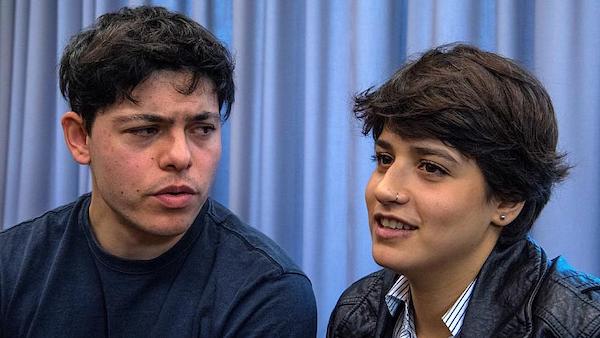
German-Irish volunteer Sean Binder and Syrian refugee Sarah Mardini - Copyright Credit: AFP
Two humanitarian activists go on trial in Athens on Thursday for providing life-saving aid to migrants and asylum seekers trying to reach Greece.
Sean Binder and Sarah Mardini have been charged with misdemeanour counts of espionage, forgery and unlawful use of radio frequencies and face a maximum eight-year sentence, convertible into a fine.
They are also under investigation for felonies, which could see them face up to 25 years in jail.
Human Rights Watch (HRW) have described the proceedings as "life-saving on trial".
The NGO said in a statement that the trial on the island of Lesbos relates to "humanitarian activities that are protected under international human rights law and Greek law" and called for authorities to "stop criminalising humanitarian rescuers".
They said they are on trial for their "alleged affiliations" with the search-and-rescue Emergency Response Centre International (ERCI) group and that the charges against them misrepresent the groupís operations as a smuggling ring and its fundraising activities as money laundering.
The espionage charges are meanwhile "based on the police report that their efforts to identify migrant boats in distress included monitoring Greek Coast guard and Frontex radio channels and vessels," HRW said.
"However, as the police report acknowledged, the radio channels are not encrypted and can be accessed by anyone with VHF radio. The positions of the vessels are published in real-time on commercial ship-tracking websites," they added.
Binder, an Irish-German volunteer, and Mardini, a Syrian human rights worker with refugee status, were arrested and detained for over three months in 2018. They deny all charges against them and say they were doing nothing more than helping rescue people.
HRW has called on prosecutors to request their acquittal.
Aid workers and volunteers have increasingly found themselves in the crosshairs of Greek authorities.
Bill Van Esveld, associate childrenís rights director at HRW, said that "the Greek authoritiesí misuse of the criminal justice system to harass these humanitarian rescuers seems designed to deter future rescue efforts, which will only put lives at risk."
"The slipshod investigation and absurd charges, including espionage, against people engaged in life-saving work reeks of politically motivated prosecution," he added.
Itís not just Greece, however. According to the European Union Agency for Fundamental Rights, Germany, Italy, Malta, the Netherlands, Spain and Greece have initiated 58 investigations and legal proceedings since 2016 against private entities involved in search and rescue.
Binder told AP earlier this month that "itís important to challenge these in the courts, to not at all sit back and accept that we should be cast as smugglers or spies because I offered CPR, (or) more often than not just a smile, to someone in distress."
"It is preposterous that we should be cast as criminals. I donít accept it....It doesnít matter who you are, you donít deserve to drown in the sea."
Nearly 1.1 million people arrived in Greece by sea alone between 2015 and 2018 - three-quarters of whom did so in 2015. Lesbos was one of the most impacted Greek islands and thousands of asylum-seekers continue to live there in overcrowded camps.
Thousands of people, however, did not survive the crossing. The United Nationsí Refugee Agency (UNHCR) estimates that more than 17,000 people lost their lives between 2015 and 2020 trying to cross the Mediterranean Sea to reach a European union member states including Greece, Italy, Spain, Cyprus and Malta.
Greece introduced a law in 2014 imposing severe penalties on people smugglers: 10 years imprisonment for each smuggled person, or 15 years per person if there was a danger to life, and life imprisonment if someone died. Smugglers reacted to the law by persuading or forcing their passengers to drive the boats.
Several people attempting the crossing have also been charged and slapped with prison sentences for steering inflatable dinghies carrying them and other migrants after they say smugglers abandoned them in the Aegean Sea between Turkey and Greece.
Hanad Abdi Mohammad, a 28-year-old Somali, is among them. He was recently charged as a smuggler and sentenced to 142 years in jail.
Mohammad told a small group of journalists and European Parliament lawmakers who visited him in prison last week he had no choice but to drive the boat.
He says the smuggler forced him to take over, hitting him in the face and threatening him with a gun before abandoning the dinghy in rough seas.
Dimitris Choulis, a lawyer on the island of Samos who frequently represents asylum seekers criticised the law, telling AP: "Our prisons are full of asylum-seekers who drove a boat."
"This is absurd," he concluded.
LINK: https://www.ansarpress.com/english/23976
TAGS:






























 Farkhunda Buried, Ghani Appoints Fact-Finding Team
Farkhunda Buried, Ghani Appoints Fact-Finding Team




